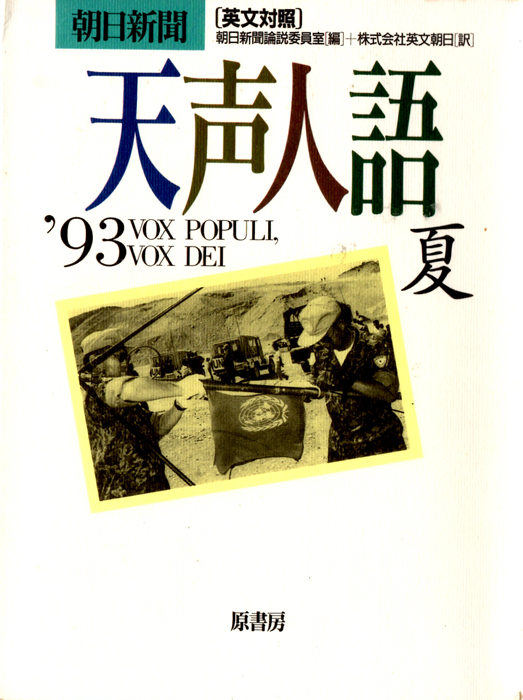
6 童謡詩人 金子みすゞの詩 P.14
作家の矢崎節夫さんは学生のころ、こういう詩に接して、激しい衝撃を受けた。「朝焼小焼だ/大漁だ/大羽鰮(おおばいわし)の/大漁だ。/浜は祭りの/やうだけど/海のなかでは/何万の/鰮のとむらひ/するだろう。」
金子みすゞという人の「大漁」と題する詩である。「人間中心の自分の目の位置をひっくり返される、深い、優しい、鮮烈さだった」。それから矢崎さんは、この詩人について知りたいと調べ始める。何せ、他の作品がなかなか見っからなかった。
このほど出版された『童謡詩人金子みすゞの生涯』に、調べてわかった事実が詳しく記されている。遺稿集三冊の発見のいきさつに始まり、みすゞの故郷、現在の山口県長門市仙崎での調査、親類や友人たちからの聞き取りがある。
今から九十年前に生まれた人だ。二十歳のころ、童謡を書いて雑誌に投稿し始め、西条八十に認められた。結婚もし、子供ももうけたが、二十六歳で死ぬ。ずいぶん短い時間に心あたたまる詩をたくさん書いたものだ。
「土」という題の詩。「こッつん こッつん/打(ぶ)たれる土は/よい畠になって/よい麦生むよ。/朝から晩まで/踏まれる土は/よい路(みち)になって/車を通すよ。/打たれぬ土は/踏まれぬ土は/要らない土か。/いえいえそれは/なのない草の/お宿をするよ。」
無用と見られようと、無名であろうと、その存在、その生命の尊さはゆるぎもしない、という思い。やさしだけではなく、つよい詩なのだ。新学期にふさわしい「私と小鳥と鈴と」。
「私が両手をひろげても、/お空はちつとも飛べないが、/飛べる小鳥は私のやうに、/地面(じべた)を速くは走れない。/私がからだをゆすつても、/きれいな音は出ないけど、/あの鳴る鈴は私のように/たくさんな唄は知らないよ。/鈴と小鳥と、それから私、/みんなちがつて、みんないい。」
参考:金子みすゞず(本名:かねこ テル)(1903~1930年) 山口県大津郡仙崎村(現・長門市仙崎)
代表作『私と小鳥と鈴と』『大漁』
大正時代末期から昭和時代初期にかけて活躍した日本の童謡詩人。
大正末期から昭和初期にかけて、26歳で死去するまでに500余編もの詩を綴り、そのうち100あまりの詩が雑誌に掲載された。1923年(大正12年)9月に『童話』『婦人倶楽部』『婦人画報』『金の星』の4誌に一斉に詩が掲載され、西條八十からは「若き童謡詩人の中の巨星」と賞賛された。
2021.10.24記す。
6. THE SUBTLE ARTISTRY OF A LITTLE-KNOWN POET
Novelist Setsuo Yazaki was shocked to read the following poem when he was a student.
It is the morning glow/The fishermen have made a large catch/A rich harvest of oba iwashi (a kind of sardine)/The beach is abuzz like a festival/But a funeral must be on in the sea/ To mourn the scores of thousands of
fish.
The poem, titled Tairyo (Large Catch), was composed by Misuzu Kaneko. "The poem struck me with its depth, tenderness and penetrating quality, turning my point of view around. Human beings had occupied the center of my way of looking at things," Yazaki says. He wanted to know more about Kaneko, but this inquiry proved difficult as her other works could not easily be found.
The findings of Yazaki's inquiry are detailed in his recently published book The Life of Misuzu Kaneko, a Poet Who Wrote for Children.
The book has an account of how the author found three collections of Kaneko's poems that had been published posthumously.
It also contains information the novelist obtained from his inquiry at Kaneko's birthplace, Senzaki in Nagato, Yamaguchi Prefecture, and from visiting her relatives and friends.
According to the book, Kaneko was born 90 years ago and started contributing children's songs to magazines when she was about 20 years old.
Her talent was acknowledged by Yaso Saijo, a famous poet. She married and had children, but she died at the age of 26. She wrote many heartwarming poems in a short time.
An example, titled Tsuchi(Earth): The earth that is beaten/Makes good cropland and produces good barley/The earth that is trodden on from morning till night/Makes a good road for vehicles/The earth that is neither beaten nor trodden on/Is it useless earth?/No, it provides the soil for nameless grass.
The poem conveys kaneko's message: to be viewed as useless or to be nameless does not utterly affect the value of a thing.
It is not only heartwarming, but also upright.
Another example, suitable for the start of a new school year and titledWatashi to Kotori to Suzu to(I, a Little Bird, and a Bell):
Even if I flap my hands/I cannot fly at all/But a little bird that can fly/Cannot run on the ground as fast as me/Even if I shake my body/I cannot make pleasing sounds/But that ringing bell does not know many songs unlike me/The
bell, the little bird, and I are all different/But make a fine trio nevertheless.
Copy on 2021.10.24
13 宮沢・クリントン会談 P.30
宮沢首相が訪米し、クリントン大統領と会談する。ひとつの興味は両者の年齢の開きである。一方は第一次世界大戦終了の次の年に生まれている。
大統領が一九四六年八月に生まれた時、首相はまもなく二十七歳になろうとしていた。その宮沢さんの初訪米は、戦前だ。十九歳の大学生だった。日米学生会議に出席、米国の人々が賛否こもごも自由に議論するのに衝撃を受けたという。
日米開戦の年に大蔵省に入った宮沢さんは、四九年、池田蔵相の秘書官になる。それから数年間蔵相とともに、ダレス米国務長官やドッジ予算局長などを相手に、敗戦後の日本の財政、経済立て直しに当った。
「向うさんに日本の意見を出そうにも、当時は在外公館はなし、タイプもない。哀れな時でした。対米折衝では、敗戦から占領時代を通じ、いやな目にもずいぶん遭った」。準備役を務めた講和会議には、吉田全権の随員として出席した。
戦前、戦中、戦後を通じて、いわば日米関係の中で生きてきたといえる。一方、クリントンさんが十九歳になるころ、日本は高度成長の最中だった。敗戦直後の日本の状況は想像もつくまい。青年期の記憶に刻まれた日米相互の像は、従って、ずいぶ違うはずだ。
その二人が会う。相互に学べることは、多いだろう。理解し合う好機になるとよい。経済案件の実務的交渉でなく、ベトナム反戦運動のころに学生だった大統領と、世界情勢や、国際新秩序などについて腹蔵のない議論をしたらどうだろう。
使われる言語も興味をそそる。六一年に訪米した池田首相は英語を話さなかった。それがよかったと、同行した宮沢さんは述懐した。「相手のペースに巻き込まれない」からというのだが、理解を深めることを第一に考えての談論風発なら、何語でもよいのではあるまいか。
2021.10.03記す。
13. OLDER MIYAZAWA, YOUNGER CLINTON
Prime Minister Kiichi Miyazawa will go to the United States and have meeting with President Bill Clinton. A point of interest is the difference in age between the two. One was born the year after the end of World War Ⅰ, while the other one was born the year after the end of World War Ⅱ.
When Clinton was born in August 1946, Miyazawa was about to become 27. Miyazawa made his first visit to the United States before World War Ⅱ when he was a 19-year-old university student. He participated in a Japan-America student conference and was shocked by the free expression of pro and con opinions by the American students.
Miyazawa, who entered the employ of the Finance Ministry the year the Pacific War started, became an aid to Finance Minister Hayato Ikeda in 1949. For several years after that, together with Ikeda, he worked on the restoration of Japan's finances and economy while dealing with Secretary of State John Foster Dulles and Budget Bureau Director Joseph M. Dodge.
"Although we wanted to convey Japanese opinions to the United States, at that time we had no diplomatic office and no typewriters there. It was a pitiful time. In negotiating with the United States, I have many unpleasant experiences from the time of defeat through the occupation years," he said. He attended the peace treaty conference, for which he made preparations, as an aid to plenipotentiary Shigeru Yoshida.
It can be said that Miyazawa lived in the middle of U.S.-Japan relations through the prewar, wartime and postwar periods. On the other hand, when Clinton was 19, Japan was in the middle of its high economic growth age, He could not possibly imagine the situation in Japan immediately after the end of World War Ⅱ. Consequently, the images of Japan and the United States recorded in their memories when they were young men must be very different.
These two are meeting. There probably are many things they can learn from each other. It would be good if the meetings become good opportunities for mutual understanding. Instead of practical negotiations on economic problems, how about Miyazawa holding frank discussions on the international situation and the new world order with Clinton, who was a university student at the time of the anti-Vietnam War movement.
The language that will be used arouses interest. Prime minister Hayato Ikeda, when he visited the United States in 1961, did not speak English. Miyazawa, who accompanied Ikeda then, recollected that this was good because not speaking English prevented Ikeda from being dragged into the American pace. But if it is lively discussion with the top priority being a deepening of understanding, any language should be all right.
Copy on 2012.10.3
|